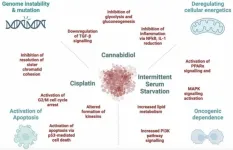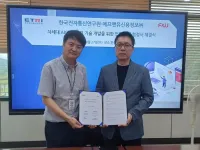(Press-News.org)
“This commentary will discuss what is known about such combinatorial treatments, including potential mechanisms and future protocols.”
BUFFALO, NY- November 15, 2024 – A new review was published in Volume 11 of Oncoscience on November 12, 2024, entitled, “Targeting carbohydrate metabolism in colorectal cancer - synergy between DNA-damaging agents, cannabinoids, and intermittent serum starvation.”
As highlighted by the authors in the abstract of this review, chemotherapy is a common treatment for many cancers. However, it is often ineffective for long-term patient survival and is typically accompanied by various adverse effects. These side effects are mainly due to toxicity to normal cells, often leading to immune system depression, nausea, loss of appetite, and metabolic changes. In this context, combining chemotherapy with cannabinoids—especially non-psychoactive ones like cannabidiol, cannabinol (CBD), and other minor cannabinoids, as well as terpenes—could offer significant benefits.
This is relevant because the mechanisms by which cannabinoids exert anticancer effects on cancer cells often differ from those of conventional chemotherapies. In addition, cannabinoids help alleviate chemotherapy-induced side effects, regulate sleep and appetite, and have shown analgesic properties. Another factor in achieving potential anticancer synergy is regulating nutrient availability and metabolism through calorie restriction and intermittent fasting in cancer cells. Since tumors require substantial energy for growth and glucose is readily available, malignant cells often rely on glucose as their primary source of ATP via substrate-level phosphorylation (fermentation) rather than oxidative phosphorylation. Therefore, periodically depriving cancer cells of glucose could create a strong synergy with chemotherapy—and possibly radiotherapy—when combined with cannabinoids.
In this review, researchers Viktoriia Cherkasova, Olga Kovalchuk, and Igor Kovalchuk from the Department of Biological Sciences at the University of Lethbridge in Alberta, Canada, explore what is known about these combinatorial treatments, including potential mechanisms and future protocols.
"In summary, our study was limited to cell viability and mRNA expression to unravel treatment synergies within (colorectal cancer) CRC cell lines, providing initial insights into the underlying molecular mechanisms of (intermittent serum starvation) ISS, CBD and cisplatin interactions.”
Continue reading: DOI: https://doi.org/10.18632/oncoscience.611
Corresponding authors: Olga Kovalchuk - olga.kovalchuk@uleth.ca, and Igor Kovalchuk - igor.kovalchuk@uleth.ca
Keywords: cancer, colorectal cancer, cisplatin, cannabidiol, intermittent serum starvation, chemotherapy
About Oncoscience:
Oncoscience is a peer-reviewed, open-access, traditional journal covering the rapidly growing field of cancer research, especially emergent topics not currently covered by other journals. This journal has a special mission: Freeing oncology from publication cost. It is free for the readers and the authors.
Oncoscience is indexed and archived by PubMed, PubMed Central, Scopus, META (Chan Zuckerberg Initiative) (2018-2022), and Dimensions (Digital Science).
To learn more about Oncoscience, visit Oncoscience.us and connect with us on social media:
X
Instagram
Facebook
YouTube
LinkedIn
For media inquiries, please contact media@impactjournals.com.
Oncoscience Journal Office
6666 East Quaker St., Suite 1
Orchard Park, NY 14127
Phone: 1-800-922-0957, option 4
END
Stress is a double-edged sword when it comes to memory: stressful or otherwise emotional events are usually more memorable, but stress can also make it harder for us to retrieve memories. In PTSD and generalized anxiety disorder, overgeneralizing aversive memories results in an inability to discriminate between dangerous and safe stimuli. However, until now, it wasn’t clear whether stress played a role in memory generalization.
Now, neuroscientists report November 15 in the Cell Press journal Cell that acute stress prevents mice from forming specific memories. Instead, the stressed mice formed generalized memories, which are ...
PHILADELPHIA—Debate continues to swirl nationally on the fate of a practice born of an 86-year-old federal statute allowing companies to pay workers with disabilities subminimum wages: anything below the federal minimum wage of $7.25 an hour, but for some roles as little as 25-cents-per-hour. Those in favor of repealing this statute highlight assumptions about reduced productivity along with the unfairness of this wage level—often used elsewhere to pay, for example, food service workers who typically make additional wages in tips. Those against repeal have voiced concerns that, without subminimum ...
EMBARGOED: NOT FOR RELEASE UNTIL FRIDAY 15 NOVEMBER 2024 AT 11:00 ET (15:00 UK TIME).
Researchers are calling for a ‘resilience index’ to be used as an indicator of policy success instead of the current focus on GDP.
They say that GDP ignores the wider implications of development and provides no information on our ability to live within our planet’s ‘safe operating space’.
In a paper published today [15 November] in the journal One Earth, researchers from the University of Southampton, UCL ...
Researchers at The Hospital for Sick Children (SickKids) have uncovered that stress changes how our brain encodes and retrieves aversive memories, and discovered a promising new way to restore appropriate memory specificity in people with post-traumatic stress disorder (PTSD).
If you stumble during a presentation, you might feel stressed the next time you have to present because your brain associates your next presentation with that one poor and aversive experience. This type of stress is tied to one memory. But stress from traumatic events ...
A team of researchers from McGill and Université de Montréal’s Observatoire pour l’éducation et la santé des enfants (OPES, or observatory on children’s health and eduation), led by Sylvana Côté, found that spending two hours a week of class time in a natural environment can reduce emotional distress among 10- to 12-year-olds who had the most significant mental health problems before the program began.
The research comes on the heels of the publication of a UNICEF ...
mRNA vaccines saved lives during the COVID-19 pandemic, but older people had less of an immune response to the vaccines than did younger adults. Why? Boston Children’s researchers, led by Byron Brook, PhD, and Ofer Levy, MD, PhD, have found some answers, while providing proof-of-concept of a new system that can model vaccine responses in a dish.
The test system, described in a paper out today in iScience, is called MEMPHIS (Modular Evaluation of immunogenicity using Multi-Platform Human In vitro Systems). It analyzes whole human blood from people of different age groups and applies both proteomics and targeted assays to measure ...
More time spent sitting, reclining or lying down during the day may increase the risk of cardiovascular disease (CVD) and death, according to a study in JACC, the flagship journal of the American College of Cardiology, and presented at the American Heart Association’s Scientific Sessions 2024. More than roughly 10-and-a-half hours of sedentary behavior per day was significantly linked with future heart failure (HF) and cardiovascular (CV) death, even among people meeting recommended levels of exercise.
“Our findings support cutting back on sedentary time to reduce cardiovascular risk, with 10.6 hours a day marking a potentially key threshold ...
XI’AN, CHINA [November 15, 2024] — The National Comprehensive Cancer Network® (NCCN®)—an alliance of leading cancer centers in the United States—is taking part in the Fourth International Congress of the Asian Oncology Society and the Chinese Congress on Holistic Integrative Oncology (2024 CCHIO) sponsored by the China Anti-Cancer Association (CACA), Chinese Institute of Development Strategy on Holistic Integrative Medicine, and Asian Oncology Society (AOS). The three-day event highlights international collaborations to improve cancer treatment and outcomes across China and beyond.
“NCCN ...
FROM: James Urton
University of Washington
206-543-2580
jurton@uw.edu
(Note: researcher contact information at the end)
Hunted nearly to extinction during 20th century whaling, the Antarctic blue whale, the world’s largest animal, went from a population size of roughly 200,000 to little more than 300. The most recent estimate in 2004 put Antarctic blue whales at less than 1% of their pre-whaling levels.
But is this population recovering? Is there just one population of Antarctic blue whales, or multiple? Do these questions matter for conservation?
A team led by Zoe Rand, a University of Washington doctoral student, tackles these questions ...
A group of South Korean researchers has decided to utilize AI technology to support customer counseling services. Through this, it will provide a significant boost to the performance and efficiency of counselors in various industries, while improving the overall quality of customer counseling services, ultimately making it easier to meet the customers’ needs and expectations while opening up the possibility for realizing new values.
Electronics and Telecommunications Research Institute (ETRI) announced that ...

